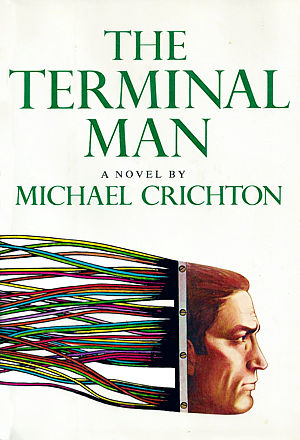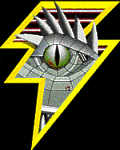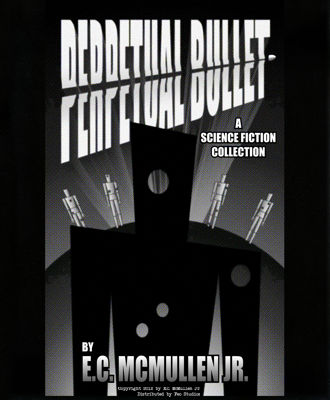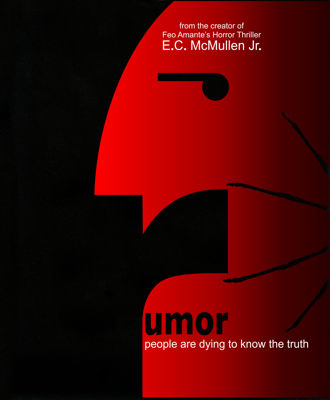 |
 |
Review by E.C. McMullen Jr. |
||

THE TERMINAL MAN- 1972by Michael Crichton USA Release: March 1, 1972 Alfred A. Knopf, Bantam Book |
||||
Michael Crichton wrote Science Fiction Horror.
Let's get that out of the way.
He didn't always write that. Even Stephen King has tried his hand at other forms but Science Fiction Horror is where Michael excelled.
When Michael Wrote a Science Fiction Horror novel, it was going to be a best seller and to this day, it is his Science Fiction Horror Thrillers that also became the most popular among those few movies adapted from his work.
By the early 1970s it was eventually realized by his publishers and Michael himself, that if his novel was one of his forays into crime drama (often under the pseudonym of John Lange) or historical drama (The Great Train Robbery), it had the best chance of being a best seller if it had a Science Fiction-style (Airframe), or Horror-style title (Eaters of the Dead).
Publishers, then as now would rather appeal to a broader audience who are into Thrillers. Add "Techno" to your Thriller and you can catch the smaller but still lucrative cross-over Science Fiction audience.
So long after his death, Michael remains a Techno-Thriller writer.
Michael's best selling 1972 novel, THE TERMINAL MAN, is a Techno Thriller. If the exact same tale was written by, say, Isaac Asimov, it would be a Science Fiction Thriller.
We're on the same page now, right?
However, Tecno-Thrillers, like many Science Fiction novels, including those written by Hugo winning stalwarts like Isaac Asimov, tend to slide into obsolecence as quickly as any of the latest cutting edge technology.
That doesn't happen with THE TERMINAL MAN.
At a Los Angeles Hospital, noon on Tuesday, March 9, 1971, two doctors, brain surgeons, wait by the Emergency ward for a special delivery. Dr. Morris and Dr. John Ellis are anxious, especially balding Dr. Ellis in his thick glasses. As the two men talk we know they're waiting for their patient, a man named Benson.
Their conversation shows them to be mundane, ordinary schlubs of humanity. Nobody of note except both of them have an extremely narrow talent in a small fraction of large field. Ellis speciality is that he's a neurosurgeon. One who becomes especially anxious right before a surgery, then calm, nearly lazy, while operating on a living human's brain.
A police van finally drives up. This is a direct delivery. Cops come out of the van and bring Harry Benson out. They remove his handcuffs and he's placed in a wheelchair. The cops push the chair with Harry and follow Dr. Morris. They aren't taking him to his room or surgery. First is is presentation.
Harry Benson, pudgy and mild-manered, has a dangerous form of epilepsy. It manifests in random, uncontrolled black-outs. When these happen, he becomes violent and harms himself and other people. He targets people and attacks them until his own attack stops. This last time Harry hospitalized a man nearly twice is size for no reason at all. It was a bridge too far. Tonight they'll be shaving his head. Tomorrow at 6am they'll be performing brain surgery.
Harry will be the first human they've ever tried this surgery on.
Harry Benson is one of the smartest computer scientists in the state and tomorrow, the doctors will surgically implant a device in his brain that will be in wireless contact with their special computer with its special program.
If all goes well, it will stop Harry's black-outs. No black-outs, no violent episodes. Harry will once again be able to live a normal life, free from attacks.
If all goes well.
Harry's psychiatrist, Janet Ross, is of two minds about this surgery. On one hand, Harry has a physical problem with his brain that no amount of psychiatry can help. No drug cocktail can treat. This surgery is Harry's only hope. She knows its also his nightmare. It's because Harry knows so much about computers that he fears this surgery. A computer is far too simple a machine to command something as complex as a human brain. Harry should know. His specialty is in artificial life: machine intelligence.
And yet Harry doesn't have a choice. Without the surgery he'll spend the rest of his life in an insane asylum, passing the days in medicated confinement as the epilepsy takes him over. He also doesn't want to hurt people.
Janet also knows these surgeons. They want to cure people, yes. But their ambitious goal is for the glory, not out of compassion. Compassionate people will monitor and tend to their patients. They'll work and fight to correct and better them for the good of the patient. People pursuing glory will only work and fight to protect their stature.
Michael Crichton needles into the details and makes them fascinating as few can, and none could do it quite like Michael.
Critics often derided Michael's work as he would come up with such fascinating premises, only for his novel to go from fascinating exploration in the first half, to an action thriller in the second half.
This is a criticism which makes no sense to me because everything he did in the first half was the obvious clackety-clack of the roller coaster chugging up that first, towering hill.
Of course its going to race down the other side, careening with all the twists and turns. Who didn't want that to happen? What else was that rollercoaster going to do? Where else could the story go? And yet, in that race through the thrills Michael never breaks the rules that he set in stone in the first half. In fact, he uses his story's internal logic to set the barries that the hero or protgonist cannot defeat, but must use their intelligence to overcome or perish.
THE TERMINAL MAN, like many of Michael Crichton's Science Fiction Horror Thrillers, doesn't have a single protagonist pursuing a hero's journey, or a single villain with their own agenda, but many. Harry Benson, Janet Ross, John Ellis, Morris, and a few others, will all have to face the music and maybe their demons over what they've done, the shortcuts they took, the choices they made, and come to terms with their character flaws.
Crichton's writing is fast-paced yet steady in its timing. We get to know the characters both in their thoughts and how they transcribe that to action. When that action comes the story doesn't become a jumble of one action sequence tumbling over the next. Instead the action plays out through the maze Michael built. All hell is breaking loose but we witness it in horrible detail. THE TERMINAL MAN moves through its action like a well-choreographed fight scene, instead of a sloppy shaky-cam.
Michael's prose, never florid, gets right to the point then moves beyond to the next one.
If this was a science book, and what happens often veers in that direction, Crichton explains it briefly in easy to understand plain English. Sometimes with visual imagery to paint you a literal picture or diagram when such will save a thousand words. He didn't let the reader get lost, making this novel not only thriller but captivating and inspiring as well.
The only thing that dates this novel is that Michael specifically sets it in 1971. Take that away and THE TERMINAL MAN could be today.
Holy cow! Michael didn't even waste time with his Author's Introduction. It only serves to enhance the story.
THE TERMINAL MAN is still Horrific, Still Thrilling, after all these years.
Five Bookwyrms.





This review copyright 2024 E.C.McMullen Jr.
| GET COVERED | |
FEO AMANTE'S HORROR THRILLERCreated by:E.C.McMullen Jr. FOLLOW ME @ |
| Amazon |
| ECMJr |
| Feo Blog |
| IMDb |
| Stage32 |
| X |
| YouTube |
| Zazzle Shop |

